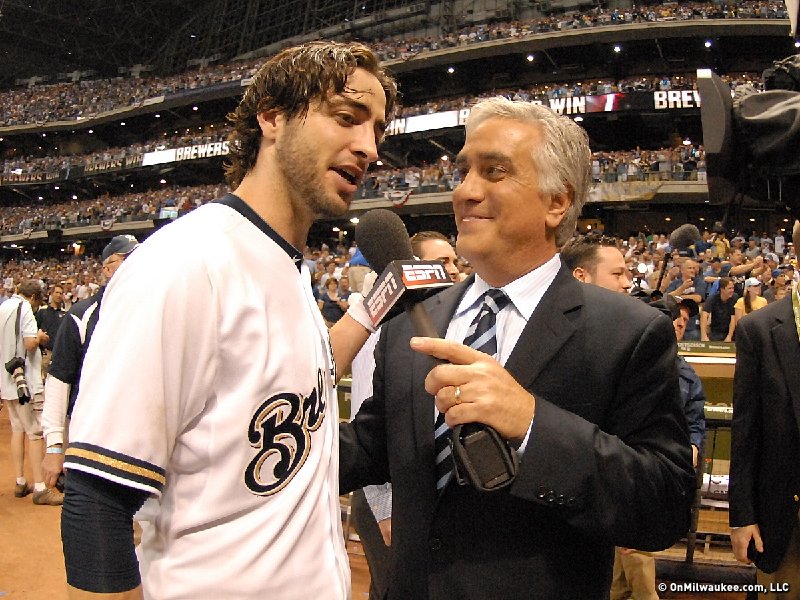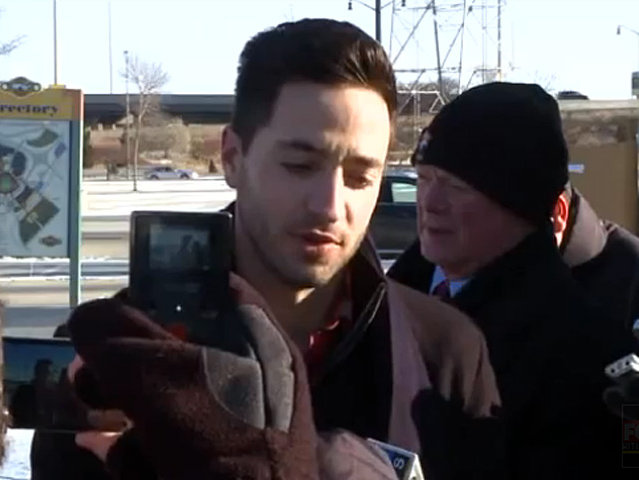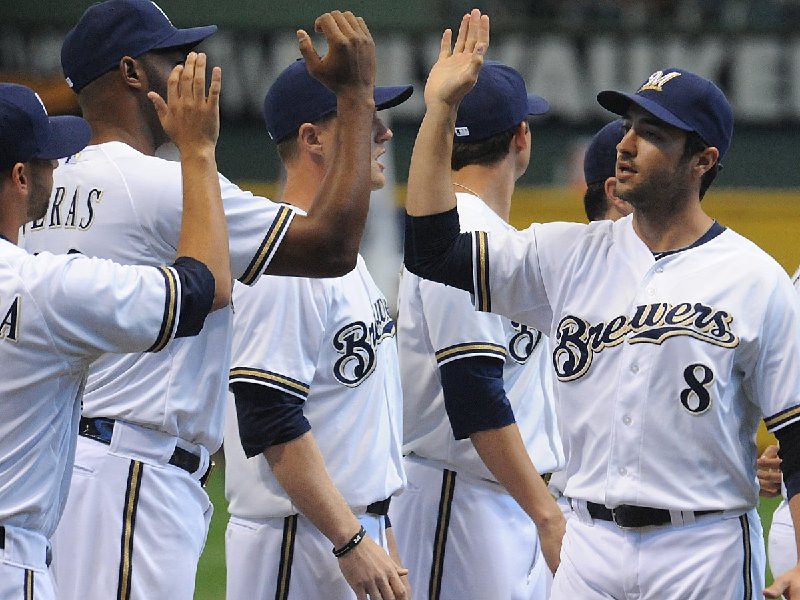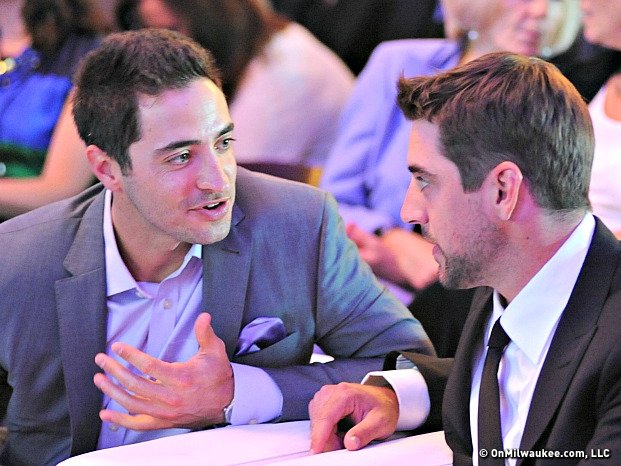It was the worst of times; it was the best of times.
The worst of times came the evening of Saturday, Dec. 10 when it was reported that Ryan Braun tested positive for a banned performance enhancing drug by ESPN.
It was the best of times when against seemingly insurmountable odds, longtime baseball arbitrator Shyam Das ruled that Braun had shown enough reasonable doubt with the chain of custody of his sample to warrant the game's first reprieve for a positive banned-substance test.
"It is the first step in restoring my good name and reputation," Braun said in a written statement Thursday. "We were able to get through this because I am innocent and the truth is on our side. We provided complete cooperation throughout, despite the highly unusual circumstances. I have been an open book, willing to share details from every aspect of my life as part of this investigation, because I have nothing to hide."
The focus of Braun's statement varies somewhat from the case presented to the arbitration panel. While Braun outside of the hearing has maintained complete and total innocence, before Das, Braun and his representatives presented a case that did not challenge the science of the ruling, but rather the procedure in which his sample was sent to the laboratory in Montreal.
Because the chain of custody was not maintained throughout the process, Braun successfully argued, no one can know for certain that there was nothing untoward happening with the cup in the interim.
For this, MLB is fuming, and naysayers maintain that because Braun did not argue the contents of the sample itself but rather the process in which it was eventually sent to the lab he is still presumed guilty of doping.
But that presumption would be a grave mistake.
There is a big difference between a winning strategy and a losing strategy. Sometimes even when righteous in your complete innocence, you will not win an acquittal. So you have to find something else that will.
In this case, it would have been fruitless to try to dispute the science of the case because in a he-said she-said type of argument the burden of proof is so great on the player that any benefit of the doubt is given to the lab; and thus, MLB. And while it seems to make sense that a test such as Braun's that had a T/E (testosterone/epitestosterone) ratio of 20:1 was out of whack considering that is an unprecedented high level, this was simply not a winning strategy.
And while it seems great in principle that if you truly believe in your total innocence you could maintain that in court and be judged guilty, the smarter thing to do would be to find a way to get out of it altogether and explain yourself after the fact.
That is what Braun gambled on and won.
"It has always been Major League Baseball's position that no matter who tests positive, we will exhaust all avenues in pursuit of the appropriate discipline," Rob Manfred, MLB executive vice president of labor relations said in a written statement. "We have been true to that position in every instance, because baseball fans deserve nothing less. As a part of our drug testing program, the commissioner's office and the players' association agreed to a neutral third party review for instances that are under dispute.
"While we have respected that, Major League Baseball vehemently disagrees with the decision rendered by arbitrator Shyam Das."
Likewise, Travis Tygart, chief executive officer of the U.S. Anti-Doping Agency, called the decision "a real gut-kick to clean athletes."
"To have this sort of technicality of all technicalities let a player off," Tygart continued, "it's just a sad day for all the clean players and those that abide by the rules within professional baseball."
What Tygart cannot bring himself to admit is that there obviously was a flaw in Braun's test, considering that a 20:1 T/E ratio is considered impossibly high for an acceptable test (any higher T/E ratio of 4:1 triggers a positive result for performance enhancers).
The New York Daily News reported that Braun's test was "insanely high, the highest ever for anyone who has ever taken a test, twice the level of the highest test ever taken," according to a source familiar with the matter.
That alone should have invalidated the test according to the Braun camp. If that is indeed true, it is a hard point to argue against, although MLB apparently was prepared to try to do exactly that. Again, it all goes to where the burden of proof lies. In a regular court, this would have never gone to trial for lack of solid evidence. In MLB's court, you are convicted first. Then you go on trial.
But the process worked, as much as MLB wants to suck their thumbs and pout in the corner. The process worked because the independent arbitrator was just that – independent. Manfred is said to be furious with Das, and MLB is said to be considering their options and further comment.
I'm not entirely certain what that means, but if Shyam Das is fired as baseball's arbitrator, the system is more broken now than it ever was.
Das has been the chairman of baseball's arbitration panel since 1999. He has been a full-time labor arbitrator since 1977, with an undergraduate degree from Harvard, a Masters from the University of Chicago, and graduated from Yale Law in 1969. He also has sat on the arbitration panel of the NFL/NFLPA since 2004, has taught Law at the University of Pittsburgh, and is a published author.
In other words, he's not just some schlub that they plucked off the street to hear cases. And in the 12 previous rulings in the cases of performance-enhancing drug appeals, he has sided with management every time. You cannot pick and choose which rulings you like and which ones you don't.
So for every Rob Manfred and Travis Tygart that are just out for blood rather than justice, there are athletes that at least now have a sense of fairness again. That while the guilty should be punished, there is a real recourse for the innocently accused; as opposed to the dog and pony show sham of a hearing where the outcome is already predetermined.
So the process worked. But perhaps the bigger issue is how we all knew about this in the first place?
ESPN and others rushed to report the story when a source inside baseball leaked the information to noted investigative journalist Mark Fainaru-Wada. Fainaru-Wada was the co-author of the landmark book "Game of Shadows" that blew the lid off the BALCO case and changed sports forever.
But ESPN's reporting was incomplete and sloppy in their rush to break the story.
First it was a performance-enhancing drug, according to Outside The Lines. Then it was not a PED, but rather simply a banned substance, according to the New York Times. Even TMZ jumped into the fray, reporting that Braun's elevated testosterone levels were due to a "private medical issue."
This entire saga was not journalism's finest hour.
But moreover than the constant conflicting reports was the problem of the leak within MLB in the first place.
If Manfred is livid at anyone, it should be the person or persons responsible for letting what is supposed to be a confidential process be just that. We never should have known anything about Ryan Braun failing a drug test until after the process had ended – and then only if there was a final guilty verdict.
So now Braun will have to convince a skeptical baseball public that he is and has always been a clean player. He will not have a tough time doing that here in Milwaukee, for local fans circle the wagons around their own no matter what they are accused of. Just look at how San Francisco wrapped their arms around Barry Bonds when he was taking every drug under the sun and laughing all the way to the bank over it.
So what will this mean for Braun's future in Cooperstown? Only time will tell. But make no mistake about it; the Brewers and their singular superstar dodged a major bullet on Thursday. Because in this game in baseball, to the fans, its one strike and you are out.
But to some, you are still out even if that strike is overturned when the first base umpire says you checked your swing.
Doug Russell has been covering Milwaukee and Wisconsin sports for over 20 years on radio, television, magazines, and now at OnMilwaukee.com.
Over the course of his career, the Edward R. Murrow Award winner and Emmy nominee has covered the Packers in Super Bowls XXXI, XXXII and XLV, traveled to Pasadena with the Badgers for Rose Bowls, been to the Final Four with Marquette, and saw first-hand the entire Brewers playoff runs in 2008 and 2011. Doug has also covered The Masters, several PGA Championships, MLB All-Star Games, and Kentucky Derbys; the Davis Cup, the U.S. Open, and the Sugar Bowl, along with NCAA football and basketball conference championships, and for that matter just about anything else that involves a field (or court, or rink) of play.
Doug was a sports reporter and host at WTMJ-AM radio from 1996-2000, before taking his radio skills to national syndication at Sporting News Radio from 2000-2007. From 2007-2011, he hosted his own morning radio sports show back here in Milwaukee, before returning to the national scene at Yahoo! Sports Radio last July. Doug's written work has also been featured in The Sporting News, Milwaukee Magazine, Inside Wisconsin Sports, and Brewers GameDay.
Doug and his wife, Erika, split their time between their residences in Pewaukee and Houston, TX.







